- Home
- Octavia E. Butler
Parable of the Sower Page 28
Parable of the Sower Read online
Page 28
For an instant, he did knock Emery back from him. In that brief window of time, my own ears ringing from his blow, I shot him.
I knew at once that I’d hit him. He didn’t fall, but I felt his pain, and I wasn’t good for anything else for a while. Then he toppled, and I collapsed with him. But I could still see and hear, and I still had the gun.
I heard shouting. The bald gang from the highway was almost on us—six, seven, eight people. I couldn’t do anything while I was dealing with the pain, but I saw them. Instants later when the man I had shot lost consciousness or died, I was free—and needed.
Bankole had our only other gun away from camp.
I got up before I should have, almost fell down again, then shot a second attacker off Travis who was carrying Emery.
I went down again, but didn’t lose consciousness. I saw Bankole grab Tori and all but throw her to Jill. Jill caught her, turned, and ran back toward camp with her.
Bankole reached me, and I was able to get up and help him cover our retreat.
We had only the scarred trees to retreat to, but they had thick, solid-looking trunks. An attacker fired several bullets into them as we reached them.
It took me several seconds to understand that someone was shooting at us. Once I did, I dropped behind the trees with the others and looked for the opposing gun.
Our rifle thundered behind me before I could spot anything. Harry, on the job. He fired twice more. I fired twice myself, barely aiming, barely in control. I believe Bankole fired. Then I was lost, no more good for anything. I died with someone. The shooting stopped.
I died with someone else. Someone laid hands on me and I came within a fingers twitch of squeezing the trigger once more.
Bankole.
“You stupid asshole!” I whimpered. “I almost killed you.”
“You’re bleeding,” he said.
I was surprised. I tried to remember whether I’d been shot. Maybe I had just come down on a sharp piece of wood. I had no sense of my own body. I hurt, but I couldn’t have said where—or even whether the pain was mine or someone else’s. The pain was intense, yet defuse somehow. I felt…disembodied.
“Is everyone else all right?” I asked.
“Be still,” he said.
“Is it over, Bankole?”
“Yes. The survivors have run away.”
“Take my gun, then, and give it to Natividad—in case they decide to come back.”
I think I felt him take the gun from my hand. I heard muffled talk that I didn’t quite understand. That was when I realized I was losing consciousness. All right then. At least I had held on long enough to do some good.
Jill Gilchrist is dead.
She was shot in the back as she ran toward the trees carrying Tori. Bankole didn’t tell me, didn’t want me to know before I had to because, as it turned out, I was wounded myself. I was lucky. My wound was minor. It hurt, but other than that, it didn’t matter much. Jill was unlucky. I found out about her death when I came to and heard Allie’s hoarse screaming grief.
Jill had gotten Tori back to the trees, put her down, then, without a sound, folded to the ground as though taking cover. Emery had grabbed Tori and huddled, crying with her in terror and relief. Everyone else had been busy, first taking cover, then firing or directing fire. Travis was the first to see the blood pooling around Jill. He shouted for Bankole, then turned Jill onto her back and saw blood welling from what turned out to be an exit wound in her chest. Bankole says she died before he reached her. No last words, no last sight of her sister, not even the assurance that she had saved the little girl. She had. Tori was bruised, but fine. Everyone was fine except Jill.
My own wound, to be honest, was a big scratch. A bullet had plowed a furrow straight through the flesh of my left side, leaving little damage, a lot of blood, a couple of holes in my shirt, and a lot of pain. The wound throbbed worse than a burn, but it wasn’t disabling.
“Cowboy wound,” Harry said when he and Zahra came to look me over. They looked dirty and miserable, but Harry tried to be upbeat for me. They had just helped to bury Jill. The group had, with hands, sticks, and our hatchet, dug a shallow grave for her while I was unconscious. They put her among the trees’ roots, covered her, and rolled big rocks atop her grave. The trees were to have her, but the dogs and the cannibals were not.
The group had decided to bed down for the night where we were, even though our oak copse should have been rejected as an overnight camp because it was too close to the highway.
“You’re a goddamn fool and too big to carry” Zahra told me. “So just rest there and let Bankole take care of you. Not that anyone could stop him.”
“You’ve just got a cowboy wound,” Harry repeated. “In that book I bought, people are always getting shot in the side or the arm or the shoulder, and it’s nothing—although Bankole says a good percentage of them would have died of tetanus or some other infection.”
“Thanks for the encouragement,” I said.
Zahra gave him a look, then patted my arm. “Don’t worry,” she said. “No germ will get past that old man. He’s mad as hell at you for getting yourself shot. Says if you had any sense, you would have stayed back here with the babies.”
“What?”
“Hey, he’s old,” Harry said. “What do you expect.”
I sighed. “How’s Allie?”
“Crying.” He shook his head. “She won’t let anyone near her except Justin. Even he keeps trying to comfort her. It upsets him that she’s crying.”
“Emery and Tori are kind of beaten up, too,” Zahra said. “They’re the other reason we’re not moving.” She paused. “Hey, Lauren, you ever notice anything funny about those two—Emery and Tori, I mean? And about that guy Mora, too.”
Something clicked into place for me, and I sighed again. “They’re sharers, aren’t they?”
“Yes, all of them—both adults and both kids. You knew?”
“Not until now. I did notice something odd: that tentativeness and touchiness—not wanting to be touched, I mean. And they were all slaves. My brother Marcus once said what good slaves sharers would make.”
“That Mora guy wants to leave,” Harry said.
“So let him go,” I answered. “He tried to run out on us just before the shooting.”
“He came back. He even helped dig Jill’s grave. I mean he wants us all to leave. He says that gang we beat will come back when it’s dark.”
“He’s sure?”
“Yeah. He’s going crazy, wanting to get his kid out of here.”
“Can Emery and Tori make it?”
“I’ll carry Tori,” a new voice said. “Emery can make it.” Grayson Mora, of course. Last seen abandoning ship.
I got up slowly. My side hurt. Bankole had cleaned and bandaged the wound while I was unconscious, and that was a piece of luck. Now, though, I felt half-conscious, half-detached from my body. I felt everything except pain as though through a thick layer of cotton. Only the pain was sharp and real. I was almost grateful for it.
“I can walk,” I said after trying a few steps. “But I feel like I’m walking on stilts. I don’t know if I can keep the usual pace.”
Grayson Mora stepped close to me. He glanced at Harry as though he wished Harry would go away. Harry just stared back at him.
“How many times did you die?” Mora asked me.
“Three at least,” I answered, as though this were a sane conversation. “Maybe four. I never did it like that before—over and over. Insane. But you look well enough.”
His expression hardened as though I’d slapped him. Of course, I had insulted him. I’d said, Where were you, man and fellow sharer, while your woman and your group were in danger. Funny. There I was, speaking a language I hadn’t realized I knew.
“I had to get Doe out of danger,” he said. “I had no gun, anyway.”
“Can you shoot?”
He hesitated. “Never shot before,” he admitted, dropping his voice to a mumble. Again I�
�d shamed him—this time without meaning to.
“When we teach you to shoot, will you, to protect the group?”
“Yeah!” Though at that moment, I think he would have preferred to shoot me.
“It hurts like hell,” I warned.
He shrugged. “Most things do.”
I looked into his thin, angry face. Were all slaves so thin—underfed, overworked, and taught that most things hurt? “Are you from this area?”
“Born in Sacramento.”
“Then we need all the information you can give us. Even without a gun, we need you to help us survive here.”
“My information is to get out of here before those things up the hill throw paint on themselves and start shooting people and setting fires.”
“Oh, shit,” I said. “So that’s what they are.”
“What’d you think they were?”
“I didn’t have a chance to think about them. It wouldn’t have mattered anyway. Harry, did you guys strip the dead?”
“Yeah.” He gave me a thin smile. “We got another gun—a .38. I put some stuff in your pack from the ones you killed.”
“Thank you. I don’t know that I can carry my pack yet. Maybe Bankole—”
“He’s already got it on his cart. Let’s go.”
We headed out toward the road.
“Is that how you do it?” Grayson Mora asked, walking next to me. “Whoever kills takes?”
“Yes, but we don’t kill unless someone threatens us,” I said. “We don’t hunt people. We don’t eat human flesh. We fight together against enemies. If one of us is in need, the rest help out. And we don’t steal from one another, ever.”
“Emery said that. I didn’t believe her at first.”
“Will you live as we do?”
“…yeah. I guess so.”
I hesitated. “So what else is wrong? I can see that you don’t trust us, even now.”
He walked closer to me, but did not touch me. “Where’d that white man come from?” he demanded.
“I’ve known him all my life,” I said. “He and I and the others have kept one another alive for a long time, now.”
“But…him and those others, they don’t feel anything. You’re the only one who feels.”
“We call it sharing. I’m the only one.”
“But they… You…”
“We help each other. A group is strong. One or two people are easier to rob and kill.”
“Yeah.” He looked around at the others. There was no great trust or liking in his expression, but he looked more relaxed, more satisfied. He looked as though he had solved a troubling puzzle.
Testing him, I let myself stumble. It was easy. I still had little feeling in my feet and legs.
Mora stepped aside. He didn’t touch me or offer help. Sweet guy.
I left Mora, went over to Allie, and walked with her for a while. Her grief and resentment were like a wall against me—against everyone, I suppose, but I was the one bothering her at the moment. And I was alive and her sister was dead, and her sister was the only family she had left, and why didn’t I just get the hell out of her face?
She never said anything. She just pretended I wasn’t there. She pushed Justin along in his carriage and wiped tears from her stony face now and then with a swift, whiplike motion. She was hurting herself, doing that. She was rubbing her face too hard, too fast, rubbing it raw. She was hurting me, too, and I didn’t need any more pain. I stayed with her, though, until her defenses began to crumble under a new wave of crippling grief. She stopped hurting herself and just let the tears run down her face, let them fall to her chest or to the broken blacktop. She seemed to sag under a sudden weight.
I hugged her then. I put my hands on her shoulders and stopped her half-blind plodding. When she swung around to face me, hostile and hurting, I hugged her. She could have broken free. I was feeling far from strong just then, but after a first angry pulling away, she hung on to me and moaned. I’ve never heard anyone moan like that. She cried and moaned there at the roadside, and the others stopped and waited for us. No one spoke. Justin began to whimper and Natividad came back to comfort him. The wordless message was the same for both child and woman: In spite of your loss and pain, you aren’t alone. You still have people who care about you and want you to be all right. You still have family.
After a while, Allie and I let each other go. She isn’t a chatty woman, especially not in her pain. She took Justin from Natividad, smoothed his hair, and held him. When we began walking again, she carried him for a while, and I pushed the carriage. We walked together, and there didn’t seem to be any need to say anything.
On the road, there was a fair amount of foot traffic in both directions. Still, I worried that a big group like ours would be noticeable and locatable, no matter what. I worried because I didn’t understand the ways of our attackers.
Sometime later when Allie put Justin back into the carriage and took the carriage from me, I moved to walk with Bankole and Emery. Emery was the one who explained things to me, and she was the one who spotted the smoke from the first fire—no doubt because she was looking for it. We couldn’t tell for sure, but the fire looked as though it might have begun back as far as where we had stopped at the oak copse.
“They’ll burn everything,” Emery whispered to Bankole and me. “They won’t stop until they’ve used up all the ’ro they have. All night, they’ll be burning things. Things and people.”
’Ro, pyro, pyromania. That damned fire drug again.
“Will they follow us?” I asked.
She shrugged. “There are a lot of us, and you killed some of them. I think they’ll take their revenge on other, weaker travelers.” Another shrug. “To them we’re all the same. A traveler is a traveler.”
“So unless we get caught in one of their fires…”
“We’ll be okay, yeah. They hate everybody who isn’t them. They would have sold my Tori to get some more ’ro.”
I looked at her bruised, swollen face. Bankole had given her something for her pain. I was grateful for that, and half-angry at him for refusing to give me anything. He didn’t understand my numbness and grogginess back at the copse, and it disturbed him. Well at least that had faded away. Let him die three or four times and see how he feels. No, I’m glad he’ll never know how it feels. It makes no sense. That brief, endless agony, over and over. It makes no sense at all. I keep catching myself wondering how it is that I’m still alive.
“Emery?” I said, keeping my voice low.
She looked at me.
“You know I’m a sharer.”
She nodded, then glanced sidelong at Bankole.
“He knows,” I assured her. “But…look, you and Grayson are the first sharers I’ve known who had children.” There was no reason to tell her she and Grayson and their children were the first sharers I’d known period. “I hope to have kids myself someday, so I need to know…do they always inherit the sharing?”
“One of my boys didn’t have it,” she said. “Some feelers—sharers—can’t have any kids. I don’t know why. And I knew some who had two or three kids who didn’t have it at all. Bosses, though, they like you to have it.”
“I’ll bet they do.”
“Sometimes,” she continued, “sometimes they pay more for people who have it. Especially kids.”
Her kids. Yet they had taken a boy who wasn’t a sharer and left a girl who was. How long would it have been before they came back for the girl? Perhaps they had a lucrative offer for the boys as a pair, so they sold them first.
“My god,” Bankole said. “This country has slipped back two hundred years.”
“Things were better when I was little,” Emery said. “My mother always said they would get better again. Good times would come back. She said they always did. My father would shake his head and not say anything.” She looked around to see where Tori was and spotted her on Grayson Mora’s shoulders. Then she caught sight of something else, and she gasped.
W
e followed her gaze and saw fire creeping over the hills behind us—far behind us, but not far enough. This was some new fire, whipping along in the dry evening breeze. Either the people who attacked us had followed us, setting fires, or someone was imitating them, echoing them.
We went on, moving faster, trying to see where we could go to be safe. On either side of the highway, there was dry grass, there were trees, living and dead. So far, the fire was only on the north side.
We kept to the south side, hoping it would be safe. There was a lake ahead, according to my map of the area—Clear Lake, it was called. The map showed it to be large, and the highway followed its northern shore for a few miles. We would reach it soon. How soon?
I calculated as we walked. Tomorrow. We should be able to camp near it tomorrow evening. Not soon enough.
I could smell the smoke now. Did that mean the wind was blowing the fire toward us?
Other people began hurrying and keeping to the south side of the road and heading west. No one went east now. There were no trucks yet, but it was getting late. They would be barreling through soon. And we should be camping for the night soon. Did we dare?
The south side still seemed free of fire behind us, but on the north side the fire crawled after us, coming no closer, but refusing to be left behind.
We went on for a while, all of us looking back often, all of us tired, some of us hurting. I called a halt and gestured us off the road to the south at a place where there was room to sit and rest.
“We can’t stay here,” Mora said. “The fire could jump the road any time.”
“We can rest here for a few moments,” I said. “We can see the fire, and it will tell us when we’d better start walking again.”
“We’d better start now!” Mora said. “If that fire gets going good, it will move faster than we can run! Best to keep well ahead of it!”
“Best to have the strength to keep ahead of it,” I said, and I took a water bottle from my pack and drank. We were within sight of the road and we had made it a rule not to eat or drink in such exposed places, but today that rule had to be suspended. To go into the hills away from the road might mean being cut off from the road by fire. We couldn’t know when or where a windblown piece of burning debris might land.

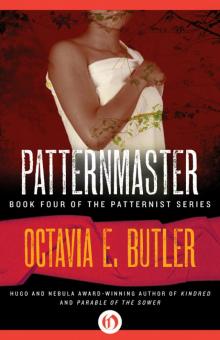 Patternmaster
Patternmaster Survivor
Survivor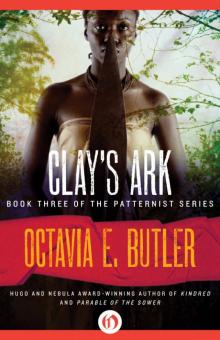 Clay's Ark
Clay's Ark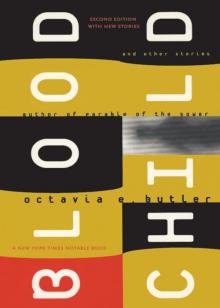 Bloodchild and Other Stories
Bloodchild and Other Stories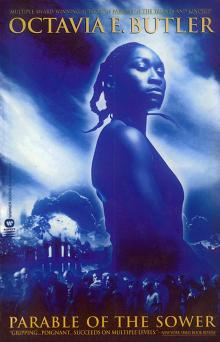 Parable of the Sower
Parable of the Sower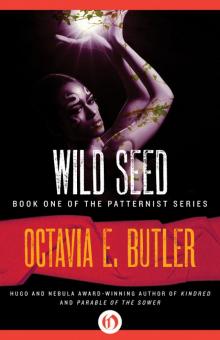 Wild Seed
Wild Seed Fledgling
Fledgling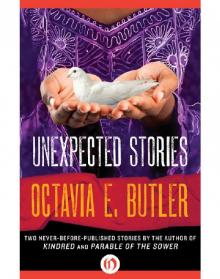 Unexpected Stories
Unexpected Stories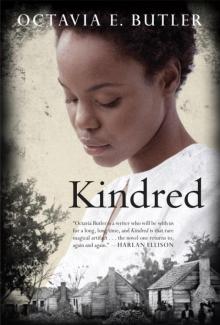 Kindred
Kindred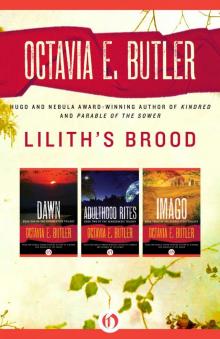 Lilith's Brood: Dawn / Adulthood Rites / Imago
Lilith's Brood: Dawn / Adulthood Rites / Imago Adulthood Rites
Adulthood Rites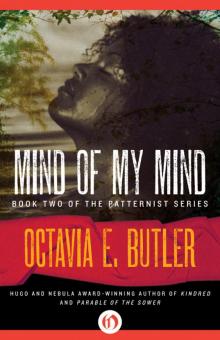 Mind of My Mind
Mind of My Mind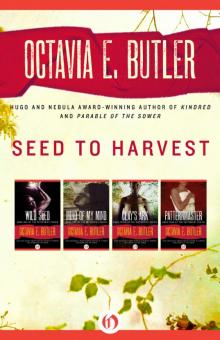 Seed to Harvest
Seed to Harvest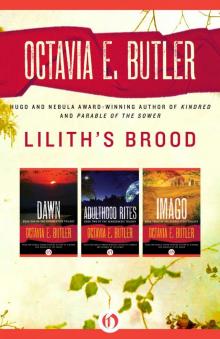 Lilith's Brood: Dawn, Adulthood Rites, and Imago (Xenogenesis Trilogy)
Lilith's Brood: Dawn, Adulthood Rites, and Imago (Xenogenesis Trilogy)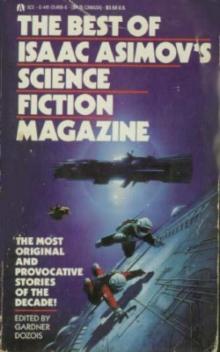 Bloodchild
Bloodchild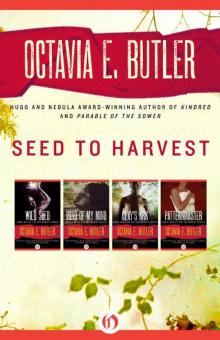 Seed to Harvest: Wild Seed, Mind of My Mind, Clay's Ark, and Patternmaster (Patternist)
Seed to Harvest: Wild Seed, Mind of My Mind, Clay's Ark, and Patternmaster (Patternist)